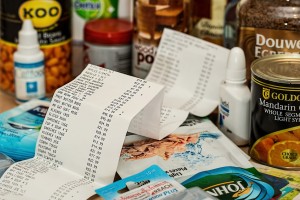Maybe it is time to try what many Americans are trying…an all cash diet. Maybe living with credit cards has created problems that are just as hard as trying to keep a little cash in your wallet. 
Want to know how to go about it? Begin with an estimation of how much money comes into your home for an entire month. Designate the direction for each dime of it. Plan how much needs to be spent for regular fixed expenses and put that in your debit or checking account. Then divvy up the cash for the expenses that might cost a variable amount. These expenses might have other names for you, like food, gasoline, eating out, and entertainment expense. Put the actual cash for these variable expenses into envelopes marked with both their name and the amount you put in the envelope. OSU Extension has a handy set of envelopes ready for this use, called Budget in a Box.
A woman by the name of Evelyn came into an Extension program several years ago and said she has always used cash for the food purchases for her family. Evelyn said, “I always know how much money is in that envelope. If I need a gallon of milk, the cash is ready for me. If I need to buy quite a few groceries, I keep tabs in the store so I don’t overspend the cash in that envelope. It has reduced the amount I spend at the store and I know I have less waste at home because when the envelope gets thin at the end of the month, fewer groceries come home. Then I try to make the most of foods that have been stored for a while in my pantry or refrigerator.”
Before you jump on the cash diet band wagon, Bankrate.com encourages you to consider the safety of all cash in your home. Even with home and rental insurance, cash isn’t necessarily covered in your insurance policy if it should come up missing.
You may find that you still need to rely on credit cards for safety reasons. Carrying cash for vacation travel is not the safest way to carry money. You may wish to use your credit card for specific purposes like vacations or a regular expense like gasoline. Using your credit card sparingly can also help your credit score.
How? As you use cash to pay down your credit card balance, your credit score number should improve, or go up. But when you have the credit card paid off, if you do not use the credit card, you may discover that you know longer have a FICO score. That happens when there is no credit card activity for six to eighteen months. So using a credit card occasionally and paying the credit card off can help your credit score.
For many families, going cash only, even for several months, can give a clearer picture of how your money is being spent. For many of us, handing over a $20 bill makes a more indelible impression than zipping a credit card through a card reader.

